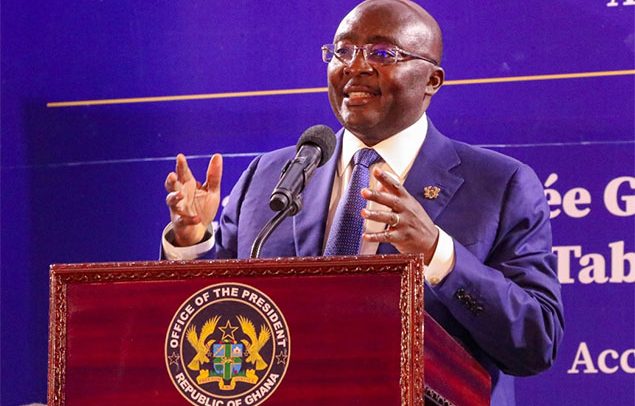Dr Mahamudu Bawumia
Vice President Dr. Mahamudu Bawumia has announced that effective January 1, 2023, all large scale mining companies shall sell 20% of all refined gold at their refineries to the Bank of Ghana in Ghana Cedis before the export of the gold.
According to him, this is part of the measures agreed upon to operationalise the government’s use of gold to purchase oil products, in a form of a barter trade to support the country’s forex reserve accumulation and promote local currency stability.
In a post on his Facebook page, the Vice President said the Minister for Lands and Natural Resources, Samuel A. Jinapor had issued directives in that respect, for the Bank of Ghana and the Precious Minerals Marketing Company (PMMC) to coordinate with the large scale mining companies to ensure compliance.
“Effective 1st January, 2023, all Community Mining Schemes (CMS) shall sell their gold outputs to the Government through PMMC. All mining licences for CMS shall include a clause mandating licensees to sell their gold output to the Government,” Dr. Bawumia quoted the directive as saying.
He indicated that all licensed small scale gold miners shall sell their gold to the government through PMMC, effective January 1, 2023, adding that all small scale gold mining licences shall include a clause mandating licensees to sell their gold to the government.
He reiterated that the gold to be purchased by the Bank of Ghana and the PMMC will be in cedis at spot price with no discounts.
“These directives would also help local gold refineries obtain gold supplies from PMMC to support their operations as they work toward obtaining the required London Bullion Market (LBMA) certification,” the Vice President noted.
Later, his spokesperson, Dr. Gideon Boako explained that the ‘gold for oil’ programme is basically going to be a government to government transaction. “Government of Ghana (GoG) will buy gold locally with cedis through PMMC and Bank of Ghana (financier). Purchased gold will be in the government vault at the Bank of Ghana.
“GoG will then exchange the gold for fuel (oil) in a barter form from, for example, the government of UAE,” he explained.
According to him, the significant drain on the country’s forex is from oil imports, and that once the government is able to lock “that tunnel” the country will be in control of the forex exchange volatility.
“The gold purchase for stocking will still be in place. It is a matter of increasing your gold purchases and some arrangement has been made with the miners in that respect,” he added.
Dr. Boako said oil imports in this case will be done directly by the government instead of the Oil Marketing Companies (OMCs).
“They (OMCs) always buy USD from BoG thereby reducing the stock of the country’s foreign reserves, with the corollary effect on the cedi’s depreciation,” he noted.
He continued that the OMCs price the oil they sell to the local market with a “huge exchange rate factor,” pointing out that “currently, they use GH¢19 to the dollar in the pricing.”
“Once we do this barter, the exchange rate component in the pricing will be eliminated and that in itself can bring down the cost of a litre of fuel by about GH¢4 to GH¢5,” he posited.
In his view, the policy will help the government to address the issue of high fuel cost and substantial and persistent depreciation of the cedi.
By Ernest Kofi Adu

